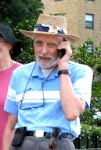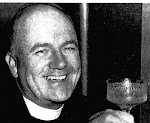.
(It's hot, I finally got AC, so why go out, when I can go through the Deposition of Monsignor Richard Loomis from Tuesday September 15th released around midnight last night. Here are the salient quotes:)
Q: Why are you on leave?
A: I was accused of abuse.
(Loomis claims he employs himself doing proofreading from home, and he lives alone… John Manly remarks that the Monsignor is wearing clerics.)
A: I have never been instructed not to wear clerics.
Q: Okay. Are you engaged in a canonical process on the accusations against you?
A: Yes.
Q: And where does that process stand today?
A: It’s in Rome.
Q: Was there a trial held in Los Angeles?
A: Yes.
(Donald Woods objects on the basis of “pontifical secrecy.”)
MANLY: Do you have a legal objection?
WOODS: The next one I mentioned was not relevant to this case.
(Manly explains that since Monsignor was once Vicar for Clergy in charge of handling sex abuse claims for the L.A. Archdiocese, and he also had accusations against himself, “It goes to procedures, it goes to the competency of the Archdiocese in terms of who they put in leadership positions, so is your legal objection relevance?)
WOODS: It’s not our purpose to argue these things out here. But not only is it not relevant to this case, but it is also collateral. And it would lead us to a 352 issue.
A PONTIFICAL ISSUE
MANLY: 352 may be an issue at trial. Not in discovery. Monsignor Loomis has testified extensively in a prior deposition that I have a copy of about the accusations against him. There was a trial here, as I understand it, a canonical trial. And there was an outcome, which is in Rome one way or the other. I want to know, there was a finding of fact. I'm certainly entitled to ask that question.
WOODS: It is considered a pontifical order, a pontifical secret within the church. And it leads to collateral, all kinds of collateral issues.
MANLY: You're asking me to take your word for it. You wouldn't take mine and I'm not going to take yours. I'm asking you, what is a pontifical secret. Do I get Dan Brown and look there? What is it?
WOODS: We'll take it up before the court.
DONALD STEIER: Record should reflect the term First Amendment. Later we can debate it, but the record should be noted.
MANLY: Pontifical secret, the First Amendment, relevancy and what else?
STEIER: Well. 352.
THE CHURCH STILL KEEPING SECRETS
MANLY: In that canonical trial, who was the advocate for the church, or what’s it called in civil parlance, the prosecutor? Who were the judges?
A: I have been told that I am not supposed to reveal that under the canonical process.
Q: Told by whom?
WOODS: Again within the church, it’s something that is maintained confidential
(CofA: We are talking here about allegations of sex crimes against a Monsignor, that were never made public. In the Twenty-First Century )
Woods: All the people involved in the process have taken an oath to keep it confidential and unless it’s absolutely relevant-
MANLY: Can I get a copy of that oath?
WOODS: - to a civil proceeding and we have an order from the court, we're not going to go into it. I am going to instruct him not to answer.
MANLY: Can I get a copy of this oath?
WOODS: No.
(Manly says he’s not going to ask every question about the trial, then, since they're going to object. Steier opines that by law Manly should say every question for them to object to each one individually. Manly goes back to deposing Monsignor Loomis.)
Q: Have you been restored? What is your current status at the Archdiocese, Monsignor?
A: I'm on leave.
Q: How long have you been on leave?
A: Approximately a little over five years, that's best I can say.
Q: Okay and are you being paid?
A: Yes.
Q: Do you still retain the title of pastor at your former parish?
A: No.
Q: In terms of admin, if you need, you know, to be reimbursed or something like that, who do you-
A: The Vicar for Clergy Office.
Q: Who is that today?
A: Monsignor Michael Meyers.
Q: What was the last time you saw Michael Baker?
A: In my office as Vicar for Clergy in the earlier part of 2000.
Q: When did you first meet Michael Baker?
A: In the fall of 1972, when I entered St. John’s Seminary.
Q: And in what capacity was he at St. John’s?
A: He was a student there, a deacon. I was a first year student.
(Baker was ordained, Loomis was a first year student, so they didn't know each other. Loomis says he never had contact with Baker again until he was Vicar for Clergy, “Other than we might have attended the same meetings. But I have no specific recollection of anything.”)
A: I know he and Monsignor Dyer were friends.
Q: Were they classmates?
A: Yes.
Q: How did you know that?
A: Monsignor Dyer told me. In the transition period.
(Dyer was Vicar for Clergy before Loomis.
Wonder what made him bring up Baker then?)
Q: What was the Archdiocese policy in or around 1996 regarding placement of priests who had offended children sexually in the ministry?
(There’s some argument over semantics then:)
THE WITNESS: I don't remember the specific policy. I don't think there was one that I remember even reading that talked specifically about people involved with minors being in or out of ministry.
(Whoa, Loomis must be studying answer evasion from Bill Clinton. So when did the future Vicar for Clergy, whose job was among other things handling sex abuse claims against priests, learn there was a policy about pedophiles? )
MANLY: When is the first time you can recall ever learning that there was a policy in place regarding the placement of priests who had sexually molested minors in the ministry?
WOODS: Hold on. I am going to object. Assumes facts not in evidence that there was a policy and it doesn't state the policy very clearly. But I’ll let him answer.
THE WITNESS: The only policy that I'm aware of was a policy that was put out approximately 1987 or so that dealt with sexual misconduct by clergy and outlined a process for addressing them.
Q: Okay. When did you first learn that Michael Baker had molested a child?
A: During the transition period, when I was coming into the Vicar for Clergy office.
Q: So sometime in 1996?
A: It would have been 95 I think.
MANLY: And who told you?
A: I was told by three people actually in different - I don't know if you call them briefings or not. But I asked to talk to different people. Monsignor Dyer, Bishop Thomas Curry, and Cardinal Mahony.
Q: When you learned this, were you surprised?
A: Yes I was. It wasn’t something that I was expecting to hear.
Q: What did Monsignor Dyer tell you?
A: He told me that because Michael Baker had self disclosed that his case had been handled somewhat differently than other cases.
Q: Okay. Wait. How many cases were there?
A: I don't know at that point.
Q: Did they give you a briefing on alleged perpetrators within the Archdiocese?
A: Not a briefing on - as such going down. There were all of the different people. I did take a period of time where I reviewed some of the files.
(Is it just me or do you hear a lie and then an attempt to recover in the above?)
Q: How did the Baker name come up?
A: I don't remember the specific situation.
Q: How old was the child that he abused?
A: I don't remember.
Q: I mean did you wonder why, if he did that, he wasn’t in jail?
WOODS: I'm going to object. Calls for speculation. I’ll let you answer.
MANLY: You can answer.
THE WITNESS: I don't think I can answer that. I don't know. I didn't specifically reflect on that.
Q: Did the thought ever occur to you? You know molesting a child was a crime, right?
A: Yes.
WHY WASN’T BAKER IN PRISON A LONG TIME AGO?
Q: And you're in charge of the priests and somebody tells you a priest molested a child. Did the thought ever cross your mind, why isn’t this guy in prison?
A: I was not in charge at that time.
Q: Did you ever ask the Cardinal or Bishop Curry or Monsignor Dyer?
A: No. Not in that time frame, no.
Q: Did you ever ask them?
A: There was- toward the end of my time as Vicar for Clergy there was- I made a suggestion that the police should be called.
Q: Did they do that?
A: No.
Q: Who did you suggest that to?
A: To the Cardinal.
Q: Did he tell you why he wouldn't do it?
A: I was told that Michael Baker had submitted a hand written letter asking for laicization that the Cardinal was to forward to Rome.
(CofA: All they care about is their own little insular world.)
TWO MEN FROM ARIZONA
LOOMIS: It was toward the end of my term as Vicar for Clergy after the lawsuit involving Arizona came.
MANLY: There were two boys in Tucson? You suggested calling the police regarding those two children, correct?
A: It was after that, while Michael Baker was on leave and out of the ministry, we discovered that he had performed three baptisms which he did not have permission to do. And at that point I said, you know, there is no cooperation here, we ought to take further action.
Q: Who else was present, if anyone, when you suggested that to the Cardinal?
A: The suggestion was made by memo.
Q: And did he respond?
A: Yes. He wrote on the memo. And initially his response was to proceed. But then through the General Counsel’s office I heard that he had received that letter from Baker and that we were going to wait.
IS THERE A GRAND JURY INVESTIGATION GOING ON IN LA?
Q: Have you been asked to testify in front of a grand jury?
A: No.
Q: At any time?
A: There was a grand jury on a totally different matter up in Ventura County.
Q: When Sister Judy told you the Cardinal's suggestion was rejected, did she do that by phone, mail, email?
A: Face-to-face. I went to her office and she told me. I went to tell her what I was going to do and she told me that she had received instructions that reverse that.
Q: You told her you were going to call the police?
A: That I asked the Cardinal and he had said proceed. And then I was instructed to wait.
'DON, I DON'T BELIEVE THAT NONSENSE'
STEIER: The record should reflect that a moment ago, John, you used the term children and we all know that at the point in time we're talking about that everybody was an adult, and there is no legal requirement to make reports. There may be moral issues but not legal issues.
MANLY: Don, you ask what you want. I don't believe that nonsense.
STEIER: I'm talking about what the law says.
MANLY: You want to interrupt my deposition, do it on your own time.
(Back to deposing Monsignor Loomis: )
Q: Did you ever hear that Monsignor Dyer and Father Baker would take road trips to Tucson?
A: No.
W: Did Dyer have some contact or connection in Tucson that caused him to go there on a regular basis?
A: I’ve already said that I don't know that they were doing those.
Q: Have you ever heard that he and Banker were traveling in a car together in Tucson?
A: No.
Q: From Los Angeles?
A: No.
Q: Did Dyer and Baker socialize?
A: I don't know.
Q: They lived in the same house at St. Columbkille?
A: Yes.
Q: Did it ever come to your attention while you were Vicar for Clergy or anytime thereafter that Baker had a boy living in the rectory with him?
A: No.
Q: That Michael Baker was associating with a youth who was from Nepal?
A: No.
Q: Have you ever heard that from anyplace?
A: No.
Q: What were the restrictions on Baker with regard to him being around children, from the time you got to the Vicar for Clergy until Baker was suspended from ministry?
A: He was not to be around minors.
Q: Did you ever receive reports that Baker was around minors when you were Vicar for Clergy?
A: Right at the beginning of my term.
BAKER WAS NOT TO BE AROUND MINORS, BUT HE WAS
Q: When you heard this, I take it you were concerned?
A: I was.
Q: And were you concerned because you knew he had molested a child before? And because it was very clear to Father Baker that he was not to be around kids, right.
A: Yes.
Q: Yet he had a kid in the rectory sitting on the landing of the stairs? Yes.
A: Something along those lines. Minors were not supposed to be in the living space in any rectory.
Q: Period?
A: Period.
Q: In your mind, was this a big deal?
A: It was of concern, yes. I reported it to the Cardinal and once we had heard back from the meeting with the young man that it was apparently what we now call a boundary issue, rather than an abuse issue, at that point it was taken to the Sexual Abuse Advisory Board for their input.
(CofA: On a boundary issue, not a sex abuse issue, you call the Sex Abuse Advisory Board?)
Q: Who was on the board at the time?
A: I'm not sure that I can name everybody. The Sexual Advisory Board didn't make decisions or recommendations. We simply took the advice that the individual people chose to give and that became part of what I would put together as a recommendation to the Cardinal, not in terms of ascribing specific comments to specific people or anything of that type.
Q: Did anybody on the board recommend somebody call the police?
A: No.
THE BIG 8
MANLY: Did you ever hear, Monsignor, when you were Vicar for Clergy or thereafter, the term “The Big 8” being used to discuss certain priests accused of sexual misconduct in the Archdiocese?
A: No.
TUCSON
Q: Were there any other boundary violations after 1996?
A: No, not until we came to the Tucson lawsuit.
TO BE CONTINUED:
If I forget to post the second part of this deposition in the next couple weeks, remind me…
.
The City of Angels is Everywhere...
Also by Kay Ebeling: Read Sunset Boulevard, work in progress at City of Angels 2
This site is copyrighted by my statement. Kay Ebeling
Subscribe to:
Post Comments (Atom)










No comments:
Post a Comment